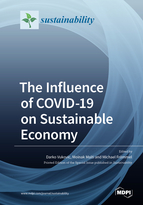The Influence of COVID-19 on Sustainable Economy
A special issue of Sustainability (ISSN 2071-1050). This special issue belongs to the section "Economic and Business Aspects of Sustainability".
Deadline for manuscript submissions: closed (1 April 2022) | Viewed by 36946
Special Issue Editors
Interests: regional economy; economic geography; investment finance; financial risk management
Special Issues, Collections and Topics in MDPI journals
Interests: asset pricing; behavioral finance; big data analytics; financial econometrics; risk modeling
Special Issues, Collections and Topics in MDPI journals
Interests: foreign exchange market; market microstructure; international financial markets; emerging markets finance; international asset management and institutional investors
Special Issues, Collections and Topics in MDPI journals
Special Issue Information
Dear Colleagues,
In this moment, the world’s biggest challenge is also one of the highest natural and social risks—Covid 19, which is threatening to become the highest disaster in recent history. Social and economic turmoil associated with disasters, especially with the coronavirus pandemic, has wide-ranging and severe impacts on financial markets, including stock, bond, and commodity (including crude oil and gold) markets and almost all social spheres. Covid-19 has reduced consumer spending that could affect a country’s services sector, especially the retail industries, hospitality, tourism, and aviation, among others. OCED cautions that the Covid-19 crisis could be more disastrous than the financial crisis of 2008. In OECD’s March report on the economic growth of all economies, OECD downgraded growth forecast from its 2020 initial forecast. As a consequence, all major financial institutions across the globe cut their forecasted statistics. The scope of this issue is to analyze the impact of Covid-19 on different spheres of economy (financial markets, macro-economies, tourism, industries, service sectors, etc.). A priority is given to studies with the analysis of quantitative data, but also welcome are studies with theoretical discussions. The purpose of this Special Issue is to offer an adequate methodology for measuring, analyzing, and preventing the impact of such crises on the economy. This issue is will assist in the development of literature of crisis analysis and prevention in the wider economy.
Dr. Darko B. Vukovic
Dr. Moinak Maiti
Prof. Michael Frömmel
Guest Editors
References
- Albulescu, C. Coronavirus and Financial Volatility: 40 Days of Fasting and Fear. SSRN Electron. J. 2020.
- Boot, A. W., Carletti, E., Haselmann, R., Kotz, H. H., Krahnen, J. P., Pelizzon, L., . & Subrahmanyam, M. G. The coronavirus and financial stability (No. 78). SAFE Policy Letter. Available online: https://safe-frankfurt.de/policy-center/policy-publications/policy-publ-detailsview/publicationname/the-coronavirus-and-financial-stability.html
- Chinazzi, M.; Davis, J.T.; Ajelli, M.; Gioannini, C.; Litvinova, M.; Merler, S.; Piontti, A.P.Y.; Mu, K.; Rossi, L.; Sun, K.; et al. The effect of travel restrictions on the spread of the 2019 novel coronavirus (COVID-19) outbreak. 2020, eaba9757.
- Gallego, V.; Nishiura, H.; Sah, R.; Rodriguez-Morales, A.J. The COVID-19 outbreak and implications for the Tokyo 2020 Summer Olympic Games. Travel Med. Infect. Dis. 2020, 101604.
- Kingsly, K., & Henri, K. Coronavirus and Carbon Transition for Developing Economies, 2020. Available at SSRN 3555901.
- Maiti, M. India’s services: sector, trade and employment. J. Law Manag. 2018, 00.
- Maiti, M. Is ESG the succeeding risk factor? Sustain. Finance Invest. 2020, Investment, 1–15.
- Maiti, M.; Vyklyuk, Y.; Vuković, D. Cryptocurrencies Chaotic Co‐movement Forecasting with Neural Networks. Internet Technol. Lett. 2020, e157.
- Vuković, D.; Vyklyuk, Y.; Matsiuk, N.; Maiti, M.; Chernova, N. Neural network forecasting in prediction Sharpe ratio: Evidence from EU debt market. A: Stat. Mech. its Appl. 2020, 542, 123331.
- Vukovic, D. B., Hanic, E., & Hanic, H. Financial integration in the European Union — the impact of the crisis on the bond market. Equilibrium. Quarterly Journal of Economics and Economic Policy, 2017, 12, 195–210. doi: 10.24136/eq.v12i1.10.
- Vuković, D.; Lapshina, K.A.; Maiti, M. European Monetary Union bond market dynamics: Pre & post crisis. Int. Bus. Finance 2019, 50, 369–380.
- Ying, T.; Wang, K.; Liu, X.; Wen, J.; Goh, E. Rethinking game consumption in tourism: a case of the 2019 novel coronavirus pneumonia outbreak in China. Tour. Recreat. Res. 2020, 1–6.
Manuscript Submission Information
Manuscripts should be submitted online at www.mdpi.com by registering and logging in to this website. Once you are registered, click here to go to the submission form. Manuscripts can be submitted until the deadline. All submissions that pass pre-check are peer-reviewed. Accepted papers will be published continuously in the journal (as soon as accepted) and will be listed together on the special issue website. Research articles, review articles as well as short communications are invited. For planned papers, a title and short abstract (about 100 words) can be sent to the Editorial Office for announcement on this website.
Submitted manuscripts should not have been published previously, nor be under consideration for publication elsewhere (except conference proceedings papers). All manuscripts are thoroughly refereed through a single-blind peer-review process. A guide for authors and other relevant information for submission of manuscripts is available on the Instructions for Authors page. Sustainability is an international peer-reviewed open access semimonthly journal published by MDPI.
Please visit the Instructions for Authors page before submitting a manuscript. The Article Processing Charge (APC) for publication in this open access journal is 2400 CHF (Swiss Francs). Submitted papers should be well formatted and use good English. Authors may use MDPI's English editing service prior to publication or during author revisions.
Keywords
- Covid-19
- financial crisis
- risk management
- tourism
- industries
- sustainability






